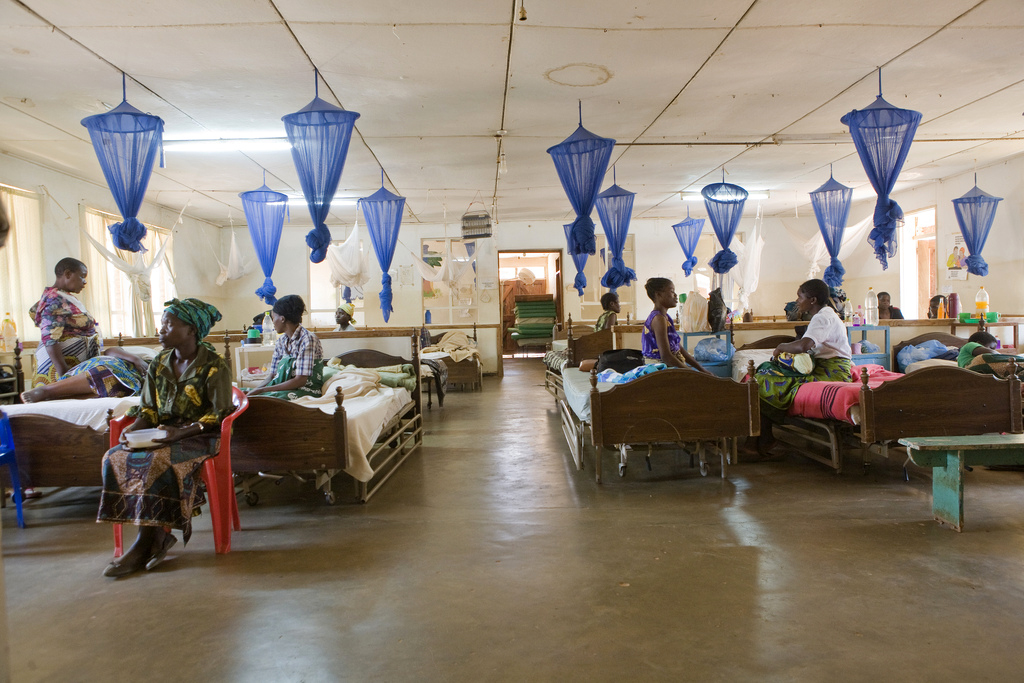Climate Change: A Global Public Health Issue
By Madeleine Thomson, Senior Research Scientist

Women and newborn babies are cared for at Ekwendeni Mission Hospital, in the Mzimba District, Malawi. Gates Foundation/Flickr.
For a long time people perceived climate change as an environmental issue–the concern of environmentalists, the concern of a few. It was reframed as a justice issue at the turn of the 21st century, when it became clear that those most likely to suffer the consequences of climate change were primarily those who had least contributed to its cause. Africa in particular has contributed little to the climate change crisis and yet is considered to be one of the regions most vulnerable to its effects.
I argue climate change is much better understood as a global public health issue and a concern for us all.
What has changed?
In the late 1990s scientists suggested that global warming might bring exotic tropical diseases to Europe and North America. They theorized that diseases such as malaria would reemerge in temperate areas, where they have long been controlled. New diseases, such as the mosquito-borne Chikunguna virus, would appear where they have never been observed before.
What might be surprising today is that many experienced tropical disease specialists disagreed at the time. They didn’t see climate change as a major concern, either for developing countries, where infectious disease remains a major killer, or in the West, where economic development and effective health services provide a substantive barrier to many emerging and reemerging diseases.
Years of experience led them to identify poverty as the primary cause of many life-threatening infections. Many considered lack of access to appropriate insecticides, medicine, vaccines and health services as the key drivers of the spiraling burden of infectious disease.
Health staff were too busy trying to stop the million or more malaria deaths each year to consider the alarming reports of the Intergovernmental Panel on Climate Change. Researchers focused on the complexity of infectious disease, the multiplicity of drivers (biological, social, environmental) and the limitations of climate-disease studies. A polarized debate ensued.
Much of the debate revolved about data, or lack thereof. This might seem surprising in an era of seemingly endless data streams, but in many developing countries, basic infectious disease outbreak data is severely lacking.
Without an understanding of how diseases responded to climate in the past, it is impossible to predict how they might respond to climate in the future.
Theoretical modeling is not enough – real observations based on a sound knowledge of what has been happening on the ground are essential if we are to understand our past, monitor the current situation and predict the future. Only in the last decade have governments and funding organizations prioritized national health surveillance systems as a means to improve public health in poor countries. In these countries, obtaining data and indicating changes in disease incidence trends are now prerequisites for funding renewal by international donors. But here, analysts in Washington, Geneva or London are often the data users, rather than national decision makers.
What gets measured, gets done.
How can national governments in some of the poorest parts of the world better manage climate related risks to health if the basic health information is lacking?
Fortunately, this is beginning to change as the new international development agenda promotes new investments in observations, data management, data analysis and data-informed national decision making.
And what about data on the climate? With all of the concern about climate change, many would be shocked to know how little we know about the regional climate in some parts of the world at spatial and temporal scales that matter to local, regional and national decision makers. It is here where climate variability and change already has a major impact on people’s health and livelihoods.
What’s exciting to me is that countries in Africa are now taking the lead on improving their own data and making it available to decision makers. In Ethiopia, Tanzania and Madagascar, information on rainfall and temperature for every 10 square kilometers and every month for the past 30 years are now available to the public. These new, quality assured data sets use the best global satellite products and combine them with the best available national observations.
A primary initial user of this new information has been the health community – in particular those dedicated to reducing the health and economic burden of malaria. Rather than seeing climate change as ‘just another’ challenge to improved health outcomes they are beginning to see that climate information is a resource to achieving their own objectives. A recent paper in Earthzine illustrates the work being done in Tanzania.
Infectious diseases are not the only climate-sensitive drivers of poor health outcomes; others include under (and increasingly over) nutrition, air pollution, weather disasters and the influence of climate impacts on the economy that ultimately affects our physical and mental health.
Health is the human face of climate change. Our health and our neighbors’ health, whether here in California or in towns throughout the developing world is where the rubber of climate change rhetoric hits the road.

You must be logged in to post a comment.